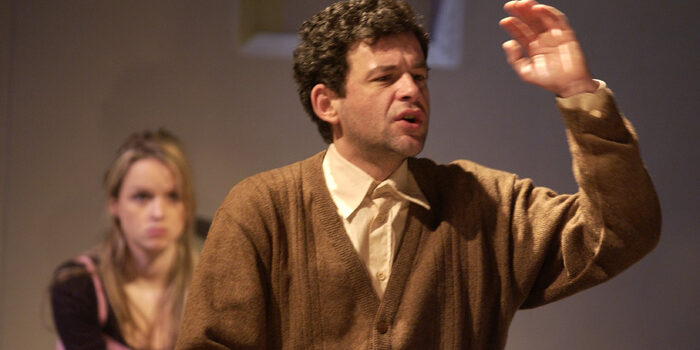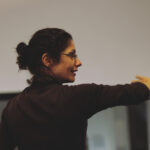Alex Chisholm looks back on Uglješa Šajtinac’s play Huddersfield, and the journey that led to her directing one of the most popular Serbian stage productions of recent years.
Uglješa Šajtinac’s Huddersfield is that rarest of things: a play that completely changed my life – and changed the lives of many who made it and saw it.
In 2003, I was working as the Literary Manager of West Yorkshire Playhouse (this was so long ago that even the name of the theatre has now changed to Leeds Playhouse) when I was asked by the head of marketing to look after a young man, Milan Govedarica, who had come on placement from the National Theatre of Belgrade. We went to see a show at the Lawrence Batley Theatre, which is in Huddersfield. When he wrote to a colleague in Belgrade about visiting Huddersfield, she replied: “That’s funny. Uglješa’s just been to the office and delivered his new script called Hadersfild’.
How this coincidence came about is one small part of the shifts in the politics and history between different parts of Europe in the late 1980s and 1990s. Uglješa (or Ugy, as he was known) had taken the opportunity afforded by the fall of Milosevic in 2001 and the lifting of sanctions to travel across Europe, and visit his beloved Liverpool, Yorkshire before arriving in Huddersfield (a journey part recorded in his 2007 book Vok on!: manifest razdraganog pesimizma Walk on!: a manifesto of happy pessimism). He took back to Zrenjanin, a small ex-industrial town in Northern Serbia, a head and heart full of impressions, ideas, and inspiration from Huddersfield, a small(ish) ex-industrial town in Northern England. Those impressions, together with his own experience of turning 30, having come through the crises of 1990s, went into the writing of Hadersfild. The play told the story of four school friends from Zrenjanin, all turning 30, and what happens when one of them returns home after 11 years living in Huddersfield. The characters of Hadersfild, like the country, arrive scarred and stunted into the 2000s, stuck in the past, or desperate to leave it behind.
Those shifts had also brought the academic and dramaturg (and regular SEEstage contributor) Duška Radosavljević to the UK, leaving behind a Yugoslavia in the process of imploding. By the time I heard about Hadersfild the play, Duška was already making an English translation of Huddersfield, having already translated Ugy’s first play, The Propmaster, for its Huddersfield production. When I read that translation, I realised I knew the perfect playwright to create a properly Northern English version of the text, the theatre maker Chris Thorpe. (I do understand, then and now, the strong differences of opinion over the merits of one person translation, vs a two-person translation. I’ve commissioned in both models and believe either works as long as everyone is happy with the model).
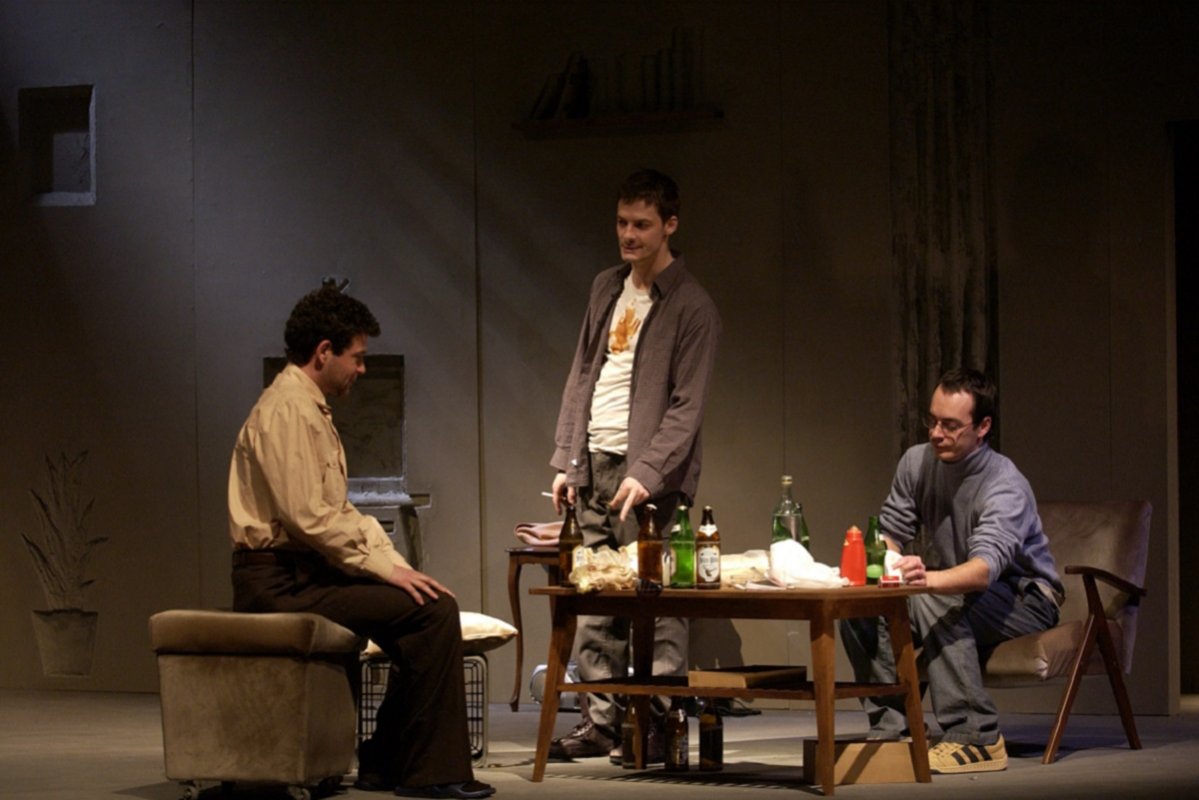
Huddersfield at JDP Photo: Nenad Petrović
Chris and Ugy turned out to be, as I thought, almost like brothers. Chris’ version of the text, based on Duška’s translation of Uglješa’s original, was at once completely Chris and completely Ugy. It captured both Zrenjanin and Huddersfield. In those days I programmed a season of Northern new playwrighting at the West Yorkshire Playhouse called Northern Exposure. In 2004 I was able to programme three full new productions including Huddersfield. That’s three full productions over four weeks, with a total acting company of 11. (Things were not exactly ‘better in the old days’ but it’s true I wouldn’t be able to programme this season now. Budgets, risks, and casts have all shrunk.)
Huddersfield did well. It got a good review in the Guardian and got the attention of a Belgrade theatre which, sweetened by the promise of funding from the British Council (something else that doesn’t really happen now).
At New Year 2005, I arrived in Belgrade to direct the Serbian premiere at the Yugoslav Drama Theatre (JDP). I had been given a stellar cast –Nebojša Glogovac and Goran Šušljik, then in their 30s and the rising stars of the ensemble; Josif Tatić who had a long and glorious career in Yugoslav theatre and film, and from outside the JDP, Vojin Ćetković, fresh from a popular TV show; Damjan Kecojević, as Igor the returnee from Huddersfield, who appropriately had the most experience outside Serbia; and Tijana Mladenović, playing the 16-year-old Milica, making one of her first theatre performances.
Miloš Krecković (Krecko), dramaturg at JDP, was at the centre of encouraging new playwrights in Serbia and forging links with playwriting in other countries. He talked me through the casting process. Nebojša, or Glogi, as he was known at the theatre, was a naturally charismatic actor, a classical ‘leading man’. It was initially expected he would be interested in the role of Raša, the tortured anti-hero at the centre of the play. But instead, he opted for Ivan, the mentally troubled neighbour, who offered him a more interesting acting challenge. I remember in our first meeting Nebojša playing with his ever-present coffee and cigarette, slipping in and out of Ivan’s physicality. Nebojša was one of the finest, most instinctive actors I’ve ever worked with, and he could see something in the role of Ivan that attracted him. His tragically early death from lung cancer in 2018 makes the memories of those early days of rehearsal, wreathed in cigarette smoke, even more bittersweet.
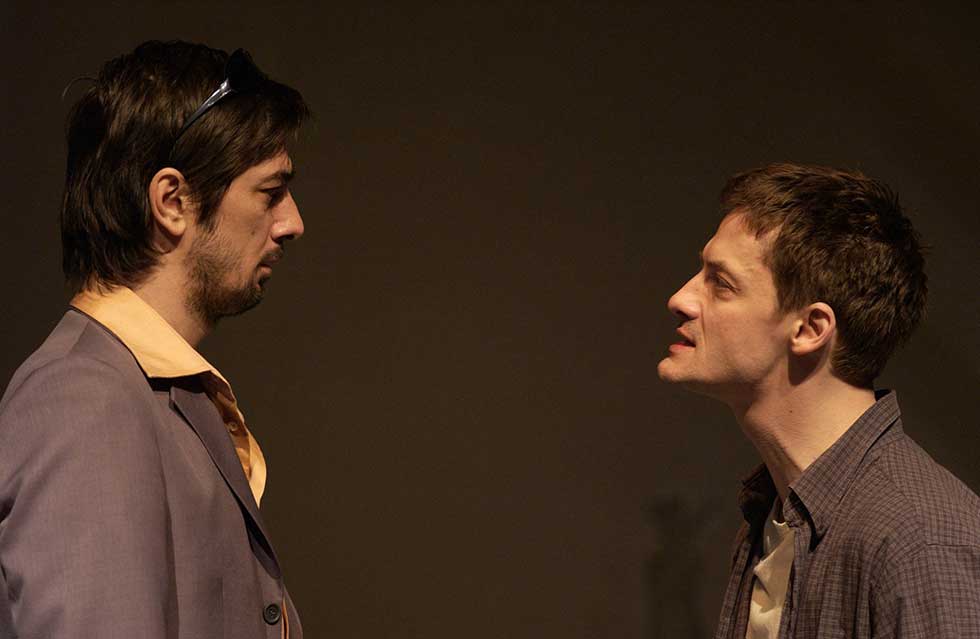
Huddersfield at JDP Photo: Nenad Petrović.
The constant cigarette smoke was only one of the many differences I needed to adjust to in rehearsals in Serbia. There is a tendency to idealise the theatre of other countries, or to patriotically champion your own as better. But my experience is that there are good and bad examples in any type of theatre, we tend not to see our own assumptions and habits so clearly from within the system. I believe we all benefit from encountering different theatre cultures, which can make us reassess, challenge, and enlarge our own practice. Not from the point of view that ‘everything is better over there’ but from seeing ourselves more clearly from the perspective of working in a different way, with others who don’t share our own assumptions.
My own assumptions were challenged in many ways. We had about six weeks of rehearsal which seemed long to me but was actually shorter than usual for the theatre. Rehearsals were 10.30am (invariably someone was late) to 2pm when actors had to disappear to prepare for that evening’s performance, not the 10 – 6 I was used to. Closer to production we would have all-day ‘double-rehearsals’. After the first weeks of table discussions, we moved into the actual theatre. With ensemble actors in up to 30 other performances in the repertoire, they don’t have much time to spend line-learning. The method (this was 20 years ago and may now be very dated!) was the actor worked with the prompter who stood in the auditorium feeding them lines. Hearing the play constantly in stereo did my head in to begin with but was normal to everyone else.
Rehearsals took place in a mix of English and Serbian, assisted by my dramaturg and translator, Marija Stojanović, herself a brilliant playwright and poet. At one point Marija made me a handy glossary of frequently used phrases including ‘Od pocetka, i sada sa glumom’ (From the beginning and now with acting). I discovered that actors who had other shows to do, and lives to live, weren’t going to give 100% committed performance in rehearsal, and would instead do what I would call ‘marking’. But I felt I needed to see the whole performance. Neither approach was wrong – but we were coming at it with different expectations.
There are many other examples of this – of ideas and concepts for which there was no translation – ‘pick up your cues’ I would say, to general confusion. One of my favourites was after one of the last general rehearsals, I called a notes session. Goran, who had the best deadpan stare and dry delivery, just looked at me and said ‘Of course you would have a name for that’ – in Serbia I think it is just called being a director.
One striking difference was the manifestation of hierarchy within the theatre. All theatre systems have hierarchy, acknowledged or not. I was given a phenomenal creative team to work with, including set designer Marija Kalabić, costume designer, Jelisaveta Tatić-Čuturilo , videographer Dušan Uducki, sound designer Igor Boškovič, and the lovely, gentle Vladimir Perišic as my ‘Organizator’ (stage manager). That I would insist on getting my own lunch or coffee rather than sending Vlado to get it was considered odd from a director – more by the upper echelons of the theatre than anyone else. In fact, from the theatre I got the impression that I wasn’t really director-y enough – too young, too friendly, too English possibly – with a strange insistence that the actors performed the words of the script as the writer had written them not an approximation thereof.
It would be a lie to say that rehearsals were easy, it was hard. Hard for me to adjust to a different way of working, hard for the actors to have to express themselves in English, to understand what I was asking from them, and why I was asking for it. In the final week, what I would call ‘tech week’, they have the ‘confrontation’ – when all of the set and props are supposed to arrive on stage and you add in lights and sound. Marija had made a genius set with a false perspective, and negative space in the walls for all the objects in Raša’s life that had been sold off. The set worked perfectly with what I wanted the lighting to do, Jelisaveta’s costumes captured each character, Igor had gone above and beyond with the soundtrack, Dušan’s video journey from Huddersfield to Zrenjanin which opened the show was a thing of beauty. But I still felt the performances at the centre of all this wasn’t working.
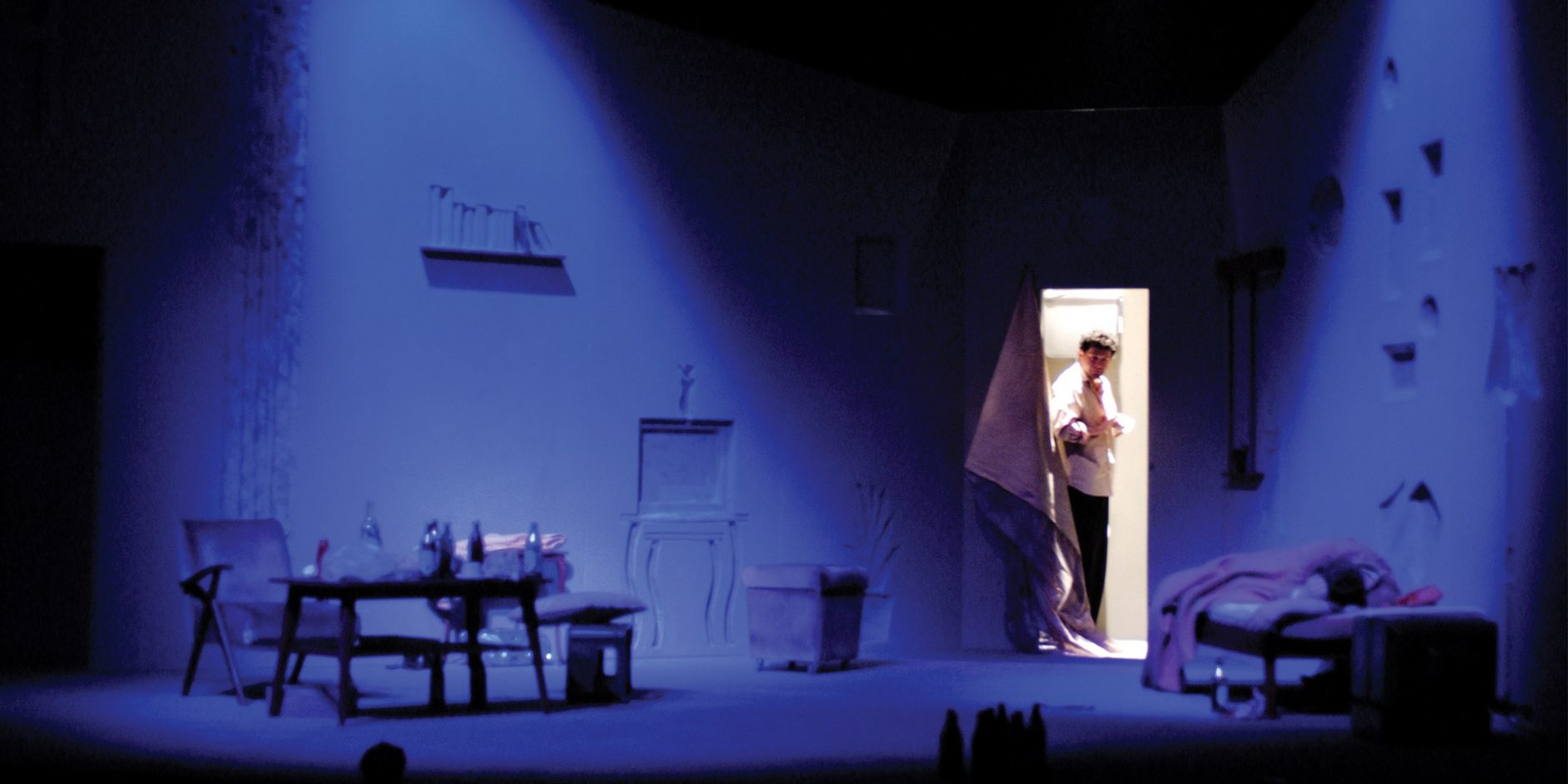
Huddersfield at JDP Photo: Nenad Petrović
During the last rehearsal, Nebojša’s line were all over the place, Goran had the frozen look of someone who was going through the motions. Everyone else was doing what they could but without those two at the heart of the show, it did not work. ‘Maybe Goran should whisper on that line’ suggested Krecko, trying to be supportive. ‘I could ask him, and he’d do it.’ I said, ‘Because he’s a really good actor and he can do anything you ask. But it wouldn’t feel real to him.’ The powers-that-be in the theatre watched the car crash, smiled, and shook their heads, as if they’d always expected it to be a disaster.
But I knew the play worked. I knew how it worked. Sometimes as a director the job is not to keep doing things to the play but hold on to the belief that it is there. Nebojša, I told to go home get some rest and read the script. With Goran I sat down with and just told him that everything Rasa was, was in him now. That he could forget everything I’d said to do, and just be. And then we let the public in.
You don’t know what the play is until it is in front of an audience. In truth, even if I had said nothing after the last rehearsal, Hadersfild might well have been a success. Maybe. In any case, from the moment in the last scene when Josif Tatić ripped the door off the toilet and marched out with it to a wave of laughter, I knew something magical was happening. I’ve never had an evening in the theatre quite like it.
Nebojša’s Ivan has been recognised as an extraordinary performance, transformative, vulnerable, intense, but it was only possible and perfectly balanced by the intensity, transformation, and trust in Goran’s performance of Rasa. That first performance, before the official opening night, was the purest it ever was – before the actors knew they were in a successful production – when they just were. The audience was the other character in the room, laughing, crying, silent, hungry for this story of people like them, people who loved each other and hurt each other, again, and again, and again, but for whom there was forgiveness, and friendship.
At the end, before the lights even finished going down Goran and Nebojsa threw their arms around each other, the joy and relief of themselves and their characters melding together as the audience rose to their feet and cheered.
Huddersfield was a huge hit. The next performance was the official premiere, everyone got drunk and told each other they knew it would be a success. Chris Thorpe was there, part of the team still, Ugy wore a Huddersfield Town football shirt. The next night I sat in the wings and watched the audience. It felt like there was something in this play that people needed to experience, pain, brutal humour, love, catharsis. Whatever it was, it was there.
The play entered the JDP repertoire, it went to festivals and won awards. It toured to the US, Croatia, and around Europe. I only went back a few times to see it. One time the box office manager (who I had of course made friends with) told me it was the performance everyone still asked for, that was still full after years, the one that people came to see again and again. The director of the theatre told me that was because of the actors, but that’s to underestimate the play. Ugljesa is the son of a poet and a poet himself. Hadersfild is bodily, visceral play. Characters piss, shit, swear, fuck, fight, eat, vomit. It is also a poetic play, not in the sense of beautiful sounding words, though it has some of those too, but in the way it is tightly and delicately structured, the layering of ideas, motifs, jokes, words, objects building up emotion and tension until the end the simplest of lines gives greatest release. Plays are always products of all the people who work on them. In this case all the actors, the Leeds cast, and the Belgrade cast, all the artists and backstage crew, were part of making the play what it was – and me as well, knowing how this production, with these people, in this time and place, had to be rooted in the music, structure, and meaning of Ugy’s words.
Later that year Milan – who had brought the play to my attention -and I got married. Our relationship had started during the first production of the play and developed during the second. He and his family generously allowed me insights and understanding of Serbian and Serbia that I otherwise would not have had. Our marriage, that started alongside the play, did not last much longer than the run of the production. The play ran in repertoire for just over ten years, The role of the Father was re-cast after the sad death of Josef Tatić, and Tijana was re-cast having moved on from playing a 16-year-old. The ages of the characters were adjusted to match the cast but eventually it was time to stop. A little while later, I called time on the marriage, but our three children call Ugy godfather, and I have a life, and a perspective on life, I would not have without this play called Huddersfield.
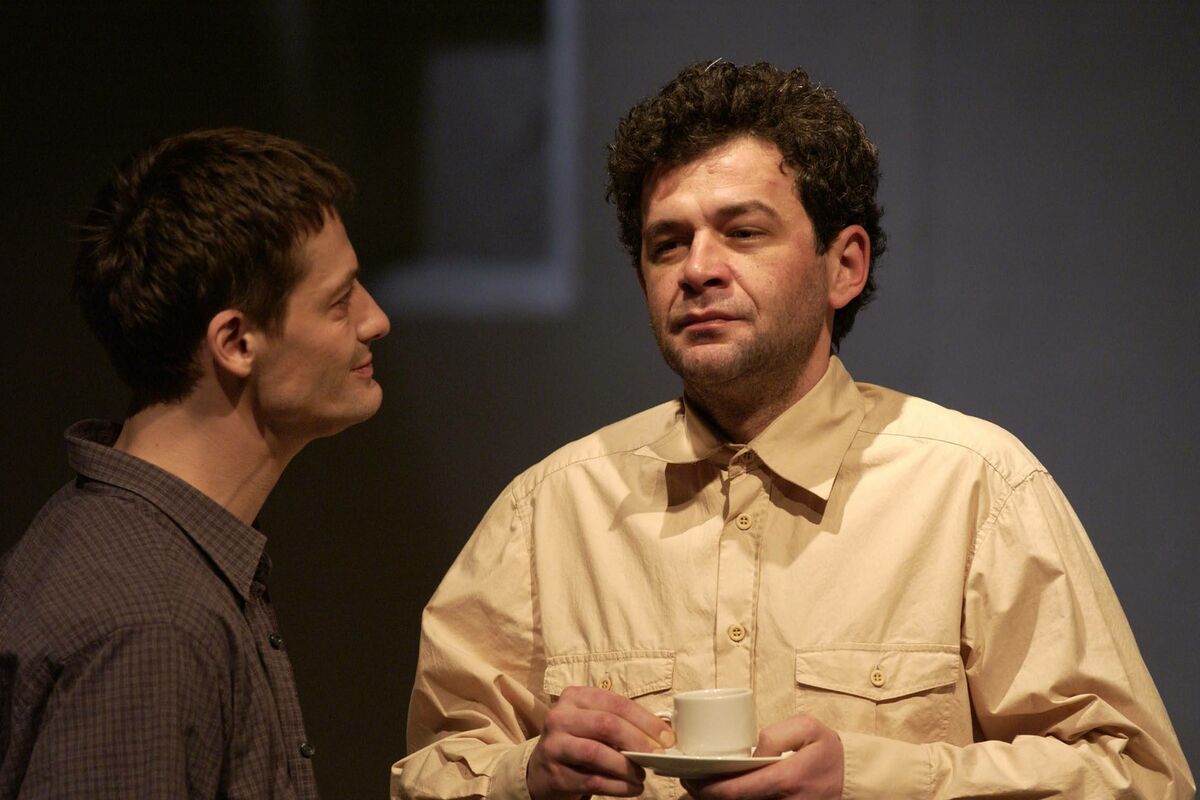
Huddersfield at JDP Photo: Nenad Petrović
A postscript. In 2020 the beginning of lock down theatres were putting out recordings of their play on YouTube including JDP. The first one they chose to show was Hadersfild, I watched it along with 1000s of others, transported back 15 years. Reading it again, I think that Rasa’s misogynistic violence and cruelty would be received very differently in 2023 than it was in 2004 – we are less forgiving of torturing anti-heroes. But that’s ok. Plays are of their own time and place which is why we always need new ones and new writers to create the magic that is needed now. Why do we keep making theatre? Because we want to and sometimes, for some people, we can. Everything we do changes something. If you’re lucky you get to be part of something that has mattered so much, for yourself, and for others.
Further reading: Duška Radosavljević’s migration diary.
Further reading: Sasha Milavic Davies on the differences between directing in Serbia and the UK
Alex Chisholm is a director, dramaturg and producer based in Leeds. Her productions include Pick n Mix by Kat Rose-Martin, Nine Lives by Zodwa Nyoni, and Conscientious by Adam Z. Robinson. She was Co-Artistic Director of Freedom Studios in Bradford 2014-2022. Alex was appointed Literary Manager at the Leeds Playhouse in December 2001 and Associate Director in January 2006. In January 2005 she was invited by Yugoslav Drama Theatre in Belgrade to direct the Serbian premiere of Huddersfield which ran for over 10 years.

